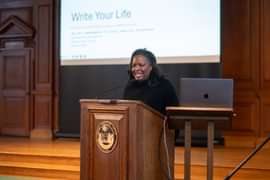
May 08, 2023
The coolest job on earth
An alumnus shares his experience working at the southernmost point on Earth.by Manwei Chan ’11
When I told people I was traveling to the South Pole to live for a year on Antarctica, I received a mixed bag of responses. The most common being, “Why?”
“Why go live at an isolated station far from friends and family, where the internet is only available eight hours a day?”
“Why subjugate yourself to living where you won’t see the sun for six months straight?”
“Why willingly put yourself in an environment where it is cold enough to make your teeth split?” (Read Apsley Cherry-Garrard’s memoir, The Worst Journey in the World.)
Being asked this question repeatedly, including by my mom, forced me to stop and think. Antarctica had been on my radar for as long as I can remember. When I discovered there were jobs there, it felt like a door had opened to this mysterious land, that had always called to me like a siren in the sea. But that siren was unfortunately guarded by the human resources departments of various Antarctic organizations. For the better part of the past decade, my applications were rejected—yet the continent continued to beckon.
When I finally received an offer, I accepted it without hesitation, without seriously questioning why.
The quick and easy answer: It’s a job. I am the caretaker of a hunk of metal and electronics focused on the sky, peering back into our cosmic history to a time that can’t even be seen by the James Webb Telescope. The rarified dry air on Antarctica’s polar plateau makes it one of the best places to study the infancy of our universe.
The cliché answer: To test my mettle in a harsh environment. The history of Antarctica is rife with true stories of heroics, gallantry, and adventure. Yet I can’t get myself to fully drink this Kool-Aid as I sit in my climate-controlled room—having recently enjoyed hot meals of steak, crab legs, and Super Bowl–worthy chicken wings—and ready myself for a hot shower.
But the truth of “why” comes down to one part professional development and two parts adventure. At its core is the pursuit of something that academic institutions such as Andover strive to foster—fundamental curiosity. Curiosity to experience whatever I can, while I can. Cosmology really puts into perspective how short human lives are in comparison to the cosmos.
I wanted to experience the wonder of living in a place where the sun watches us countdown to midnight on New Year’s Eve. Where I envy those who can grow the bushy facial hair that collects frost and creates an abominable visage. Where, during my brief, ambling commute, I can look up in amazement at the curtains of the Aurora. Where I can come to understand more about myself by means of a little Antarctic magic shared with 42 kindred spirits.
Admittedly, a tiny but undeniable factor in my being here was the unspoken challenge of all who dared to ask “Why?”
Manwei Chan ’11, a PhD candidate from MIT’s Space Telecommunications, Astronomy, and Radiation Laboratory, is responsible for maintaining the Bicep 3 and Bicep Array telescopes. Follow his adventures on Instagram @stellarpuns.
Other Stories

Best-selling author Rachel Howzell Hall delivers MLK Day keynote




